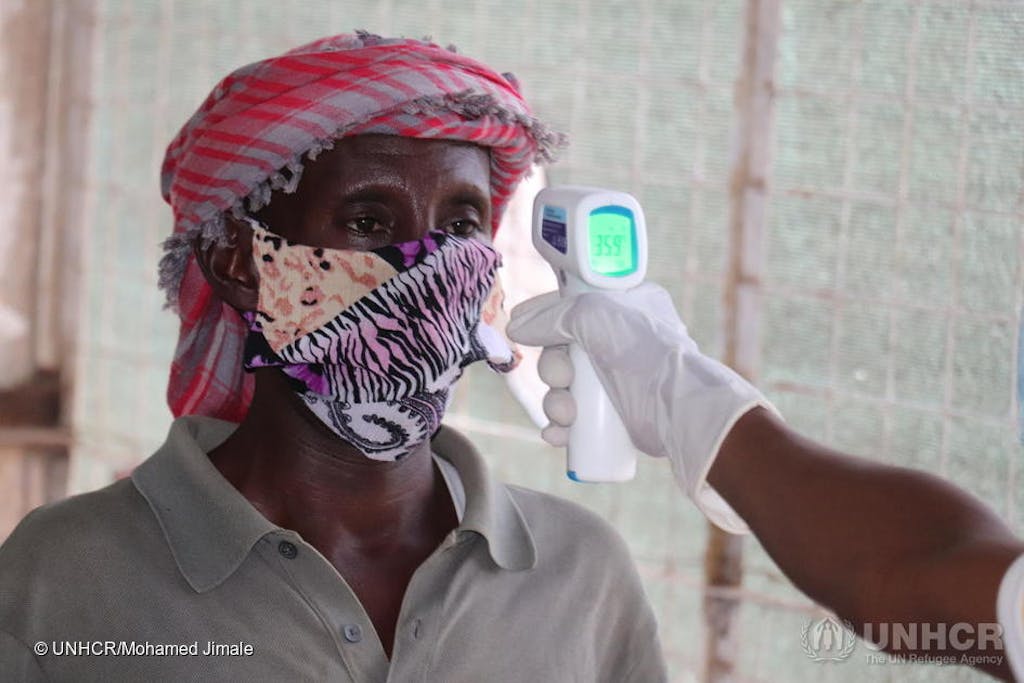For the more than 200,000 refugees in Kenya’s Dadaab camps, the global COVID-19 pandemic has amplified the vulnerability they already live with on a daily basis. Close living quarters and strained hygiene and health resources complicate refugees’ ability to practice preventive measures against the virus.
To relieve some of this pressure and protect residents against COVID-19, the UN Refugee Agency (UNHCR) is working on the frontlines in Kenya to help refugees practice safe social distancing, to facilitate handwashing, and to ensure that safety precautions are being implemented in relief distribution. In June, UNHCR received $10 million from the COVID-19 Solidarity Response Fund for the World Health Organization (WHO) — created by the United Nations Foundation, in partnership with the Swiss Philanthropy Foundation — to support its work fighting the virus in marginalized communities.
Here is a snapshot of an untypical day in the Dadaab refugee camps when refugees and asylum-seekers line up to get two months of rations of supplies during COVID-19:
Somali refugee Habiba Muhamad describes the process she goes through as she receives her food and soap at Dadaab camp in northeastern Kenya.
“During the distribution, people were divided into three groups,” she said. “We were given masks, soap, and food rations.”
As she speaks, others queue to receive their rations. Staff members from UNHCR are making sure everyone is socially distanced from one another. Everyone is wearing a mask.
As the line progresses inside the distribution center, those who are waiting to collect their supplies have their temperature checked first. A large banner is hanging inside the center, outlining the simple ways to avoid infection by the coronavirus, including washing hands, avoiding handshakes, and sneezing into elbows instead of hands.

Back outside, a woman is washing up at a handwashing station set up by UNHCR and partners, waiting for her turn to collect her items. Several jerry cans of clean water and soap are placed on a table, all spaced apart. An additional 125 hand-washing stations like this one have been set up at schools and markets, to help reduce the risk of infection.
This distribution process is part of the new normal in Dadaab and a way to fight the spread of a virus that has affected millions of people worldwide.
UNHCR announced the first two cases of COVID-19 in Dadaab in May and has worked with other humanitarian groups and the Kenyan government to enhance the response in the camps. Thanks to the COVID-19 Solidarity Response Fund, UNHCR and its partners have stepped up their efforts, working together to protect the health and wellbeing of the 217,515 refugees and asylum-seekers living in the Dadaab refugee camps (as of end of May 2020).
They are providing twice the amount of food rations and clean water, as well as hygiene products such as soap and jerrycans, to minimize large gatherings and long queues. UNHCR staff and refugee community leaders are using local radio, social media, WhatsApp, and other platforms to spread the word about COVID-19 prevention and hygiene awareness in the camps. Isolation and quarantine centers have been built and prepared to accommodate 955 more patients in case of an outbreak.
It is efforts such as these that should help drastically curb the infection rate of the coronavirus at the camp.
“During the coronavirus outbreak, so many things have been improved and have been put to effect,” said Mumina Yussuf Mahamud, a refugee from Somalia. “Hand sanitizers have been provided to keep hands clean. They have put containers with running water outside. We are covering our mouths with masks and washing our hands with the running water that’s been put outside.”
As life continues at Dadaab, things are not as they used to be. But everyone understands that the measures are in place to keep them safe.
This piece was provided by UNHCR and has been edited and published with permission.
A recent UNHCR report shows that close to 80 million people, or 1% of the world population, are currently displaced — nearly double the amount reported a decade ago. With support from the COVID-19 Solidarity Response Fund, UNHCR is able to carry out lifesaving work to tackle the pandemic in some of the world’s most vulnerable places.
YOU CAN HELP
Every action counts in the fight against COVID-19. By supporting the COVID-19 Solidarity Response Fund, you can help continued efforts to fight the coronavirus and protect the lives of refugees around the world. The Fund is the fastest and most effective way for individuals, companies, and organizations to support the work of the World Health Organization and its partners in battling the virus.
All photos: © UNHCR/Mohamed Jimale





